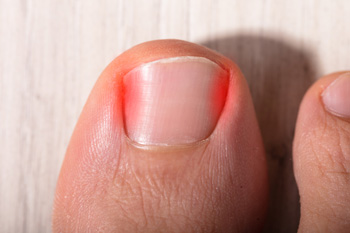
Pincer nails occur when the nail plate excessively curves, pinching the surrounding skin. They are also known as trumpet nails and are the most painful type of ingrown toenail. Unlike classic ingrown toenails, which affect one side of the big toe, pincer nails can develop on any toenail and roll into the skin on both sides of the nail plate. This condition causes discomfort and can feel like a splinter or glass as the nail digs into the skin. If left untreated, it can lead to redness, tenderness, inflammation, and even infection. Pincer nails can be caused by genetics, tight shoes, and improper toenail cutting. The elderly and pregnant women are more prone to this issue. Relief can be achieved by straightening the toenail, and in some cases, surgery may be necessary. If you are experiencing pincer nails, it is strongly suggested that you seek treatment from a podiatrist.
Ingrown toenails can become painful if they are not treated properly. For more information about ingrown toenails, contact one of our podiatrists of Princeton Foot & Ankle Associates. Our doctors can provide the care you need to keep you pain-free and on your feet.
Ingrown Toenails
Ingrown toenails occur when a toenail grows sideways into the bed of the nail, causing pain, swelling, and possibly infection.
Causes
- Bacterial infections
- Improper nail cutting such as cutting it too short or not straight across
- Trauma to the toe, such as stubbing, which causes the nail to grow back irregularly
- Ill-fitting shoes that bunch the toes too close together
- Genetic predisposition
Prevention
Because ingrown toenails are not something found outside of shoe-wearing cultures, going barefoot as often as possible will decrease the likeliness of developing ingrown toenails. Wearing proper fitting shoes and using proper cutting techniques will also help decrease your risk of developing ingrown toenails.
Treatment
Ingrown toenails are a very treatable foot condition. In minor cases, soaking the affected area in salt or antibacterial soaps will not only help with the ingrown nail itself, but also help prevent any infections from occurring. In more severe cases, surgery is an option. In either case, speaking to your podiatrist about this condition will help you get a better understanding of specific treatment options that are right for you.
If you have any questions please feel free to contact one of our offices located in Princeton and West Windsor, NJ . We offer the newest diagnostic and treatment technologies for all your foot and ankle needs.
